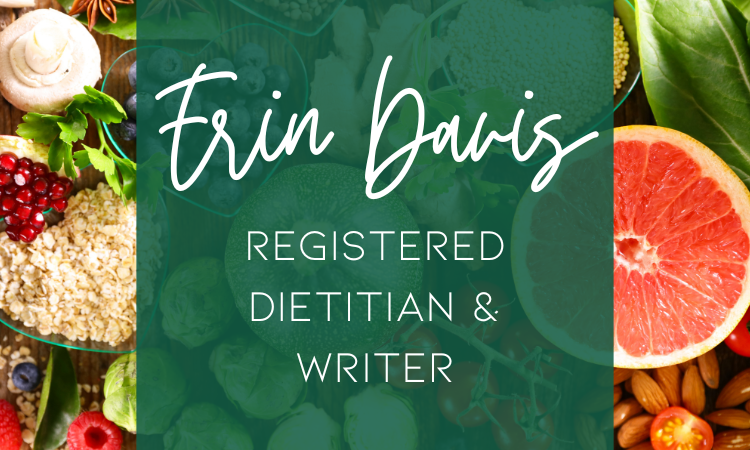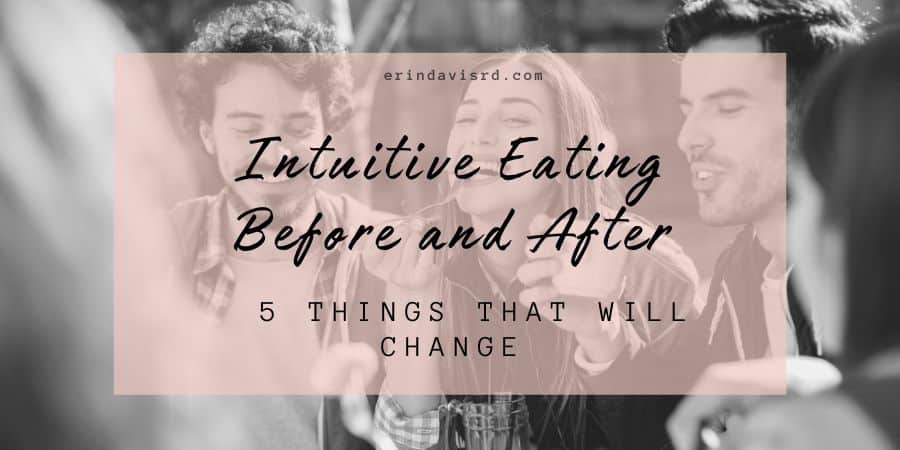What does the “intuitive eating before and after” look like? If you’ve spent any time dieting, you’ve looked at those Google images for inspiration. The before and afters.
What we usually don’t get to see is the after-after. You know, 6 months or more down the road—when the weight is back or they have near-disordered eating.
It can be difficult to give up the dream of a “perfect body”. However, you can find a low-effort weight for you while pursuing your overall health. Weight does not equal health, after all.
If I said you could have peace with your body and heal your relationship with food, would you want in?
Do you feel frustrated with your constantly failed attempts at weight loss or your unhealthy relationship with food?
If you’re new here, welcome! I’m Erin, a registered dietitian and diabetes educator specializing in intuitive eating. I help people kick dieting to curb and accept their bodies for all of the amazing things they can do.
You may be considering intuitive eating. Today, I’m sharing what to expect your intuitive eating before and after success story to be.
Please note: As an Amazon Associate, I earn from qualifying purchases.
What is Intuitive Eating?

Eating intuitively means that you eat when you are hungry, you stop when you are full, and you allow yourself to eat any food you want.
When you eat intuitively, you pay attention to how your body feels.
If I eat cheese puffs for breakfast, chances are I won’t feel energized and focused to do my tasks. Or if I eat donuts for lunch, my blood sugar will spike and crash.
Likewise, if I eat all processed foods with little fiber, my gut will not feel good.
Instead, I’ll choose foods that nourish my body. I eat a wide variety of foods, I meal plan, and I eat until I’m satisfied. And I eat the cheese puffs, donuts, and whatever else I like.
Intuitive eating before and after: 5 things that will change
When you become an intuitive eater, it’s like a heavy burden being lifted off your shoulders. Some key things change, including:
1. Feelings about weight
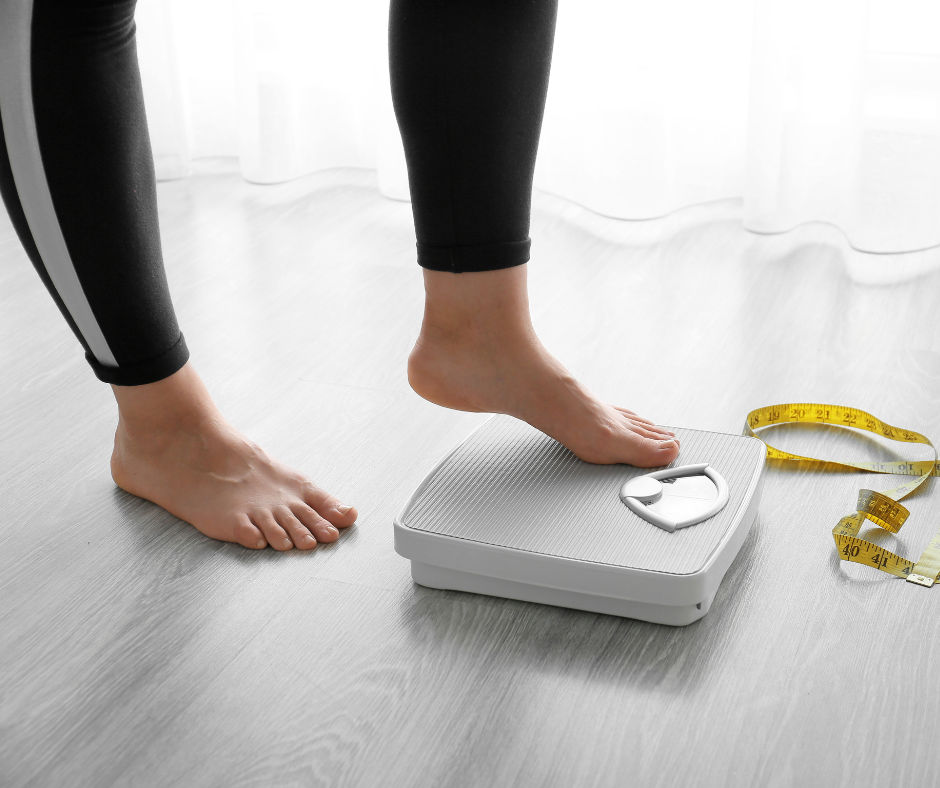
It may have taken me a while to embrace intuitive eating, but I’ve known for a long time that the scale is a terrible gauge of health.
I’ve seen that scale beat people up, emotionally and mentally. A mood can go from good to bad in a matter of seconds.
Why do we weigh ourselves? To see if we’ve done well with our dieting efforts? To see if the hard work has paid off?
What happens when we haven’t achieved our goals? We tend to quit all of those behaviors that benefit our health. Forget exercising. Forget vegetables.
It makes for an all-or-nothing attitude. Is it possible to get physical activity that is fun and feels good, without the goal of burning calories?
With intuitive eating, you learn to accept your body. Yo may not love every bit of it. But you won’t agonize over the imperfections.
We’ve all got insecurities about something. Some of the influencers I used to follow during my disordered eating period have since come clean about their issues with food.
A smaller version of yourself will not make you healthier. That is a diet culture lie.
Can’t we choose to eat a wide variety of nutrient-dense foods because they improve digestion, prevent cancer, and taste good? Or move our bodies because it’s fun?
Your body can do amazing things. You got out of bed. Maybe you fought off the viruses and bacteria you were exposed to at the grocery store.
There are so many reasons to be thankful, we just need to focus on those positives.
If you are having a hard time letting go of the scale, let’s experiment. If you are stepping on the scale every morning, take note of your mood before and after.
Also make note if the number on the scale impacted your food choices for the day. What do you say to yourself if the number isn’t what you expected? Would you say that to a good friend?
2. Feelings about food
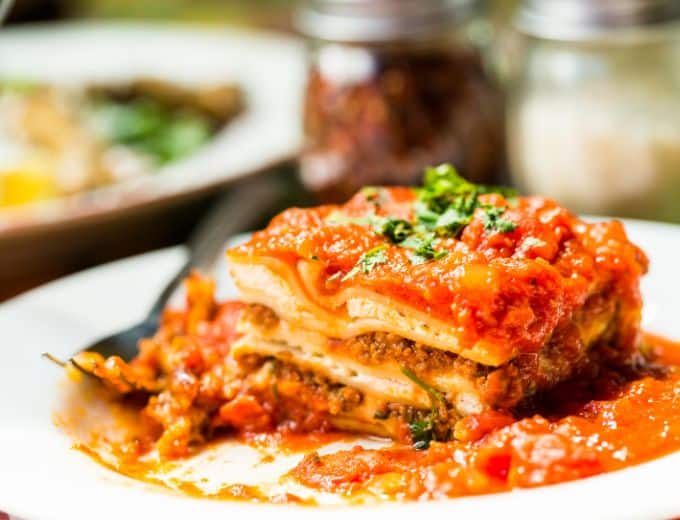
Dieting can make us fear foods. We form an unnatural aversion to certain foods because we’ve deemed them as bad.
Additionally, dieting makes us lose track of our favorite foods. We have denied them for so long, that we don’t even know what they are anymore!
Lasagna is my favorite food. I had avoided dairy and pasta for so long, I had forgotten how much I loved it.
Sit down with a pen and paper and write down your favorite foods. What are some foods you’d like to eat again that you haven’t allowed?
Does the idea of being able to eat them again excite you? Or are you fearful?
Afraid that if you allowed yourself to eat your favorite food, you might never stop? Certainly, it’s a valid concern! That is a common fear when we have forbidden foods.
We don’t trust ourselves to stop when we’ve had enough. However, when we expose ourselves to those foods through habituation, with full permission, we desire them less.
For example, the chocolate bars I have in my personal Mom stash have been there for months. When dieting, I would have likely eaten all of them on a cheat day.
However, I’ve had the opportunity to eat them whenever I want, and I don’t need them.
3. Mindfulness
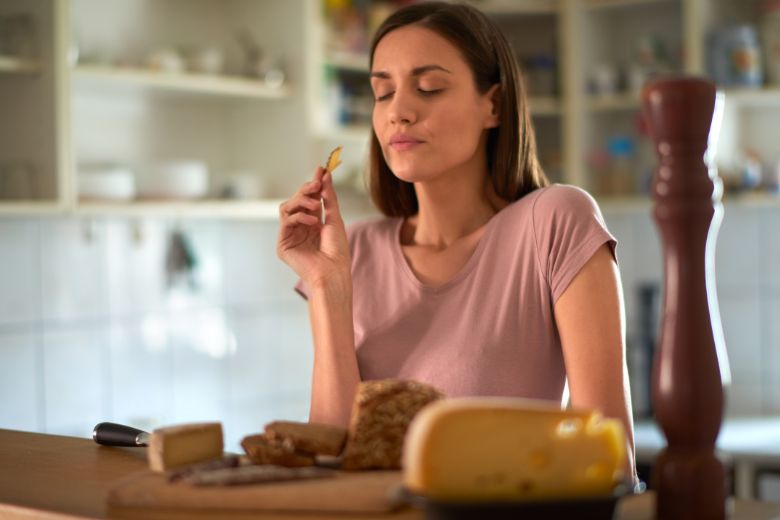
This is hard. We live on the go. This means we eat on the go. Multitasking is how we get through the day.
But, when we eat while driving, checking emails, watching TV, etc., we lose touch with our fullness cues.
When we are distracted, our signal to stop eating is the bottom of the bowl or an empty package, rather than a full stomach. This leads to unintentional overeating.
I have to say that this has been one of the most challenging for me, even to this day. I had to resist eating my lunch while I wrote this post.
Instead, I took 15 minutes to eat at the counter, allowing myself to let my body feel its fullness.
Mindfulness-based interventions have been used for binge eating disorders with great success. It works by increasing your internal awareness.
During your intuitive eating journey, you’ll learn to eat without distraction. I like to use these mindful eating activities to rewire my mealtime habits.
4. Obsession with all things diet and weight loss

Do you have a calorie or carb counter app on your phone? Maybe your step counter app is reminding you that you aren’t at your goal weight.
Are your workouts chosen based on the potential calorie burn, as opposed to what you enjoy doing?
Or, when you scroll through social media, you are bombarded with fitness models promoting their workouts and diets?
Do you have friends with whom you constantly diet-talk? Is diet the topic of most of your conversations?
That’s often the case when you are neck-deep in diet culture. Intuitive eating can change that.
Think of all the things you can talk about, besides diet. There’s so much more to life!
What will you be able to accomplish with that freed-up brain space?
When you are trying to leave dieting behind, it is a good idea to cut the ties to anything that looks like a dieting tool or triggers you to desire weight loss.
Find movement you love vs. what burns the most calories.
Unfollow people who make you feel uncomfortable about your own body. Delete those apps that may tempt you to count your calories.
Change the topic of discussion from dieting to something else. Some ideas: “What was your favorite vacation and why?”, “What is the last thing that made you laugh?”, or “What was your favorite game as a kid?”
5. Emotional coping methods

How do you cope with your emotions? Boredom, stress, anger, sadness, happiness, anxiousness, fear, etc.?
Some people eat and emotions are common reasons to eat when not hungry. It’s not a surprise that emotional eating is associated with unhealthy eating behaviors.
The food we grab when we eat spurred on by our emotions, rather than our hunger, is often high-fat, high sugar.
Part of intuitive eating is determining your triggers for emotional eating.
What are you feeling? Do you cope with difficult emotions with food?
Are you getting enough sleep? We need 7-9 hours of sleep every night. Lack of sleep can wreak havoc on your health and emotions, and often can lead to overeating.
Sometimes we just need to evaluate what it is that we really need. You may find support from friends, family.
Often, dieters use food for comfort. What are some activities that you can do to ease stress and hard emotions?
Mine are prayer, bible study, writing, time with family and friends, a walk/run outside or a fun workout, and a hot bath. Food does very little to fix any problem but hunger!
Be Patient
Remember becoming an intuitive eater does not come overnight. Especially if you have dieted most of your life. Intuitive eating will go against diet culture and your old habits.
You will be shedding off years of negative self-talk and restriction. Take the time to learn about your eating habits, enjoy your favorite foods, and heal. It will come.
If you need help in your journey, know that you are not alone. I want you to feel fully supported and can help you make peace with food.
Book a discovery call to see if my services align with your health and wellness goals.
References
- Epstein LH, Temple JL, Roemmich JN, Bouton ME. Habituation as a determinant of human food intake. Psychol Rev. 2009;116(2):384-407. doi:10.1037/a0015074
- Grohmann D, Laws KR. Two decades of mindfulness-based interventions for binge eating: A systematic review and meta-analysis. J Psychosom Res. 2021;149:110592. doi:10.1016/j.jpsychores.2021.110592
- Warren JM, Smith N, Ashwell M. A structured literature review on the role of mindfulness, mindful eating and intuitive eating in changing eating behaviours: effectiveness and associated potential mechanisms. Nutr Res Rev. 2017;30(2):272-283. doi:10.1017/S0954422417000154
- Messer M, McClure Z, Lee S, Linardon J. Bidirectional relationships between intuitive eating and shape and weight overvaluation, dissatisfaction, preoccupation, and fear of weight gain: A prospective study. Body Image. 2021;39:227-231. doi:10.1016/j.bodyim.2021.09.001
- Dakanalis A, Mentzelou M, Papadopoulou SK, et al. The Association of Emotional Eating with Overweight/Obesity, Depression, Anxiety/Stress, and Dietary Patterns: A Review of the Current Clinical Evidence. Nutrients. 2023;15(5):1173. Published 2023 Feb 26. doi:10.3390/nu15051173
- Konttinen H. Emotional eating and obesity in adults: the role of depression, sleep and genes. Proc Nutr Soc. 2020;79(3):283-289. doi:10.1017/S0029665120000166
Disclaimer: This information is intended as a self-help tool for your own use, at your own risk. My opinions do not reflect the values, thoughts, or opinions of the Academy of Nutrition and Dietetics or other professional health organizations.
About the author
Erin is a registered dietitian and diabetes educator with almost 20 years of experience. She specializes in weight-inclusive diabetes care and prevention, intuitive eating, fitness, and women’s health. She works as a consultant and writer in the health and wellness space. Erin is passionate about empowering people to manage their own health and to have peace with food.
